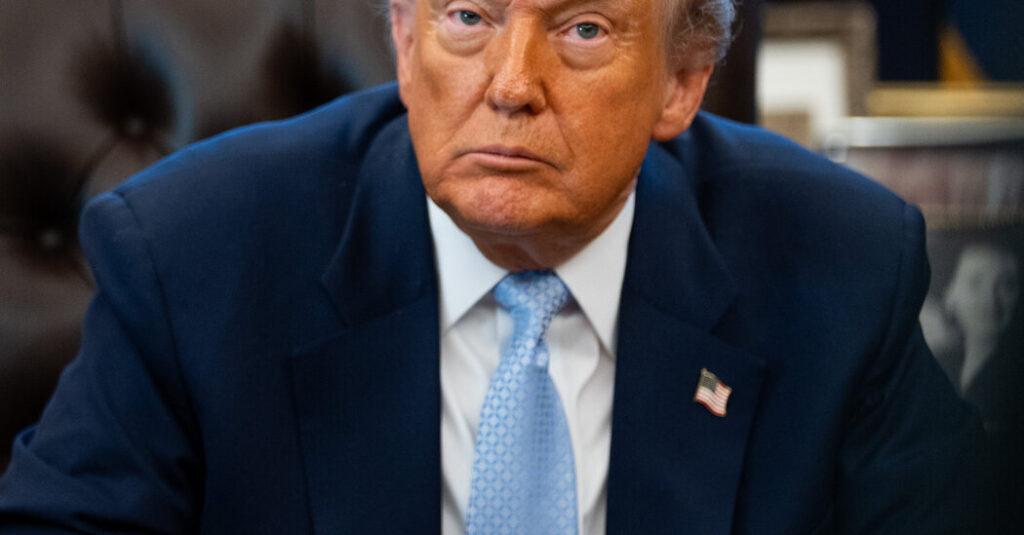Facing intense political pressure, President Trump has reversed his position on whether he supports a congressional measure that would compel the Justice Department to release more materials from the investigation into the convicted sex offender Jeffrey Epstein.
On Monday, Mr. Trump said he would sign the bill if it reached his desk.
But Mr. Trump’s sudden reversal raises a question: If the president agrees that more investigative materials in the Epstein case should be released, why is he waiting for the passage of the so-called discharge petition to do so? Why doesn’t he immediately order Attorney General Pam Bondi to make the documents public?
The fact is that if Mr. Trump chooses to, he can indeed order more files released — with or without legislation — much as he did in other cases of intense public interest, including the killings of the Rev. Dr. Martin Luther King Jr. and President John F. Kennedy.
Why doesn’t Mr. Trump release more documents?
Democrats have accused the president of trying to cover up embarrassing material by hiding files related to Mr. Epstein, his former friend who died by suicide in jail in 2019 while facing charges of sex trafficking minors.
But the White House contends that it has already made public tens of thousands of pages of documents tied to the Epstein investigation and that nothing will satisfy Mr. Trump’s critics.
In February, Ms. Bondi released a few hundred pages of documents in the Epstein case, including an evidence list, flight logs, a contact book and a heavily redacted masseuse list.
In September, House Republicans released more than 30,000 pages of documents provided to them by the Trump administration in response to a subpoena; and then another 20,000 last week from the Epstein estate.
“We’ve already given 50,000 pages,” Mr. Trump complained on Monday, adding, “No matter what we give, it’s never enough.”
But a federal judge has said there are more than 100,000 pages of files and materials related to the Justice Department’s investigation into Mr. Epstein, and the Justice Department has confirmed that it possesses more than 300 gigabytes of data and physical evidence, including files that must be withheld.
On Monday, a White House official said the administration was releasing documents in conjunction with the House Oversight Committee’s continuing investigation.
What started the clamor for the Epstein files?
For years, the allegations of sexual abuse against Mr. Epstein — and his close connections to the rich and powerful — have fueled a desire for the release of more documents about his case to expose any other potential abusers.
But Trump officials, including Ms. Bondi, repeatedly overpromised and underdelivered what they would make public, angering the president’s supporters.
When Ms. Bondi released binders full of documents titled “The Epstein Files, Phase 1” just a month into Mr. Trump’s new term, they were widely panned as a disappointment.
And there was never a “Phase 2.”
Instead, the Justice Department released an unsigned memo in July informing Mr. Trump’s base that its review of the files “revealed no incriminating ‘client list.’”
“There was also no credible evidence found that Epstein blackmailed prominent individuals as part of his actions,” the memo stated. “We did not uncover evidence that could predicate an investigation against uncharged third parties.”
By this time, Ms. Bondi had already informed Mr. Trump that his name appeared in the files.
What does the discharge petition do?
Then Congress became involved.
Using a maneuver known as a discharge petition, Representative Thomas Massie, Republican of Kentucky, and Representative Ro Khanna, Democrat of California, have been able to circumvent Republican House leadership.
Their legislation calls on the Justice Department to make public certain records related to the investigations into Mr. Epstein and his former girlfriend Ghislaine Maxwell, who is serving a 20-year prison sentence for conspiring to sexually traffic minors.
Specifically, the Justice Department must publicly disclose “all unclassified records, documents, communications and investigative materials,” including “records relating to Epstein’s detention and death; flight logs of aircraft owned or used by Epstein; individuals named in connection with Epstein’s criminal activities, civil settlements, or immunity or plea agreements; immunity deals, sealed settlements, or plea bargains of Epstein or his associates; entities with ties to Epstein’s trafficking or financial networks; and internal Justice Department communications concerning decisions to investigate or charge Epstein or his associates.”
The legislation also calls for the Justice Department, within 15 days of turning over the documents, to provide Congress with a list of all categories of records released and withheld, all redactions made and their legal basis, and “all government officials and politically exposed persons named or referenced in the released materials.”
Can the administration still withhold the documents?
Yes.
The legislation contains a list of exceptions that are very similar to the reasons Ms. Bondi initially cited in her decision to withhold many of the documents.
In withholding the files, the Justice Department said many contained images of victims, downloaded videos of illegal child sex abuse or materials that had been ordered sealed by a court. The seal served to protect victims but also to ensure the case did “not expose any additional third parties to allegations of illegal wrongdoing.”
In the legislation, the Trump administration may withhold records that are classified, identify victims or include images of child sexual abuse, or that would jeopardize an active federal investigation. The Justice Department “may not withhold or redact records on the basis of embarrassment, reputational harm or political sensitivity,” it adds.
Last week, Mr. Trump demanded that the Justice Department investigate a list of powerful men mentioned in some of the emails turned over by the Epstein estate — singling out only Democrats. Ms. Bondi said she had started the investigation.
Will the Justice Department use the new investigation to withhold documents?
After the president’s order to open an investigation into Mr. Epstein’s Democratic associates, it was unclear on Monday whether the administration intended to argue that the new investigation permitted it to deny requests for documents from previous Epstein investigations.
A Justice Department spokesman declined to comment.
Devlin Barrett contributed reporting.
Luke Broadwater covers the White House for The Times.
The post Trump Has the Power to Release the Epstein Files, With or Without Congress appeared first on New York Times.




